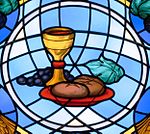
Back Ordenanza (cristianismo) Spanish Ordonnance (christianisme évangélique) French Ordinansi (Kekristenan) ID 礼典 Japanese Ôrdônansa (kristianisma) Malagasy Ordenança (cristianismo) Portuguese
| Part of a series on the |
| Eucharist |
|---|
 |
An ordinance is a term used by certain Christian denominations for a religious ritual that was instituted by Jesus for Christians to observe.[1]
Examples of ordinances include baptism and the Lord's Supper, both of which are practiced in denominations including the Anabaptist, Baptist, Churches of Christ, and Pentecostal denominations.[2][3] Some churches, including those of the Anabaptists, include headcovering and footwashing as ordinances.[4][5][6]
The number of ordinances depends on the Christian denomination, with Mennonite Anabaptists counting seven ordinances,[7] while some Baptists may name two or three.[8]
- ^ Krahn, Cornelius; Rempel, John D. (1989). Ordinances. Global Anabaptist Mennonite Encyclopedia.
The term "ordinance" emphasizes the aspect of institution by Christ and the symbolic meaning.
- ^ Engle, Paul E.; Armstrong, John H. (30 August 2009). Understanding Four Views on Baptism. Zondervan. p. 60. ISBN 9780310866985.
John Calvin and most other Protestant leaders rejected the Roman Catholic sacramental system but retained its vocabulary, applying the term "sacrament" only to ordinances instituted by God himself (cf. Westminster Confession of Faith 27; Belgic Confession 33). ... Unlike Baptists and Anabaptists, who tend to speak of baptism only as an "ordinance," Calvinists have characteristically spoken of baptism not only as an ordinance but also as a sacrament or a mystery, a rite through which God applies grace.
- ^ Howe, Claude (1991). Holman Bible Dictionary. Broadman & Holman.
Christians agree universally that baptism and the Lord's Supper were instituted by Christ and should be observed as "ordinances" or "sacraments" by His followers.
- ^ Olson, Roger (2004). The Westminster Handbook to Evangelical Theology. Westminster John Knox Press. p. 259. ISBN 0664224644.
- ^ William H. Brackney, Historical Dictionary of the Baptists, Scarecrow Press, USA, 2009, p. 219
- ^ Chris Green, Pentecostal Ecclesiology: A Reader, BRILL, Leiden, 2016, p. 176
- ^ Hartzler, Rachel Nafziger (30 April 2013). No Strings Attached: Boundary Lines in Pleasant Places: A History of Warren Street / Pleasant Oaks Mennonite Church. Wipf and Stock Publishers. ISBN 978-1-62189-635-7.
- ^ Cite error: The named reference
CrossThompson2020was invoked but never defined (see the help page).